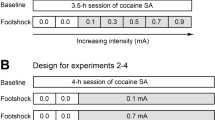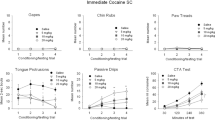Abstract
In a set of experiments designed to examine learned associations between drug states, atropine sulfate (10 mg/kg) elicited a conditional hyperthermia in rats following ten treatment sessions in which the drug was paired with either chlorpromazine hydrochloride (10 mg/kg) or ethanol (2.3 g/kg), both hypothermia-inducing agents. Atropine methyl nitrate, a quaternary analogue with similar peripheral effects but little central action, was ineffective as a cue in this situation. These experiments demonstrated that a sequential pairing of drug states can yield a change in an organism's response to the cue drug (the first drug in the sequence).
Similar content being viewed by others
References
Blozovski P, Hennocq N (1982) Effects of antimuscarinic cholinergic drugs injected systemically or into the hippocampus-intorhinal area upon passive avoidance learning in young rats. Psychopharmacology 76:351–358
Burešová O, Bureš J, Bohdanecký Z, Weiss T (1964) Effect of atropine on learning, extinction, retention, and retrieval in rats. Psychopharmacologia 5:255–263
Cunningham CL, Linakis JG (1980) Paradoxical aversive conditioning with ethanol. Pharmacol Biochem Behav 12:337–341
Gilman AG, Goodman LS, Gilman A (eds) (1980) The pharmacological basis of therapeutics (6th edn). Macmillan, New York
Hoffman RA, Zarrow MX (1958) Hypothermia in the rat, hamster, ground squirrel and pigeon following chlorpromazine. Am J Physiol 193:547–552
Kubena RK, Barry H III (1969) Generalization by rats of alcohol and atropine stimulus characteristics to other drugs. Psychopharmacologia 15:196–206
Lê AD, Poulos CX, Cappell H (1979) Conditioned tolerance to the hypothermic effect of ethyl alcohol. Science 206:1109–1110
LeBlanc J (1958) Chlorpromazine hypothermia in rats. J Appl Physiol 13:237–238
Lett BT (1983) Pavlovian drug-sickness pairings result in the conditioning of an antisickness response. Behav Neurosci 97:779–784
Revusky S (1985) Drug interactions measured through taste aversion procedures with an emphasis on medical implications. Ann NY Acad Sci 443:250–271
Revusky S, Taukulis HK, Coombes S (1980) Dependence of the Avfail effect on the sequence of training operations. Behav Neural Biol 29:430–445
Revusky S, Coombes S, Pohl RW (1982) Pharmacological generality of the Avfail effect. Behav Neural Biol 34:240–260
Revusky S, Taukulis HK, Parker LA, Coombes S (1979) Chemical aversion therapy: Rat data suggest it may be countertherapeutic to pair an addictive drug state with sickness. Behav Res Ther 17:177–188
Siegel S (1979) The role of conditioning in drug tolerance and addiction. In: Kheen JD (ed) Psychopathology in animals: Research and treatment implications. Academic Press, New York, pp 143–168
Siegel S (1983) Classical conditioning, drug tolerance, and drug dependence. In: Israel Y, Glaser FB, Kalant H, Popham RE, Schmidt W, Smart RG (eds) Research advances in alcohol and drug problems, Vol 7. Plenum Press, New York, pp 207–246
Taukulis HK (1982) Attenuation of pentobarbital-elicited hypothermia in rats with a history of pentobarbital-LiCl pairings. Pharmacol Biochem Behav 17:695–697
Whitehouse JM (1964) Effects of atropine on discrimination learning in the rat. J Comp Physiol Psychol 57:13–15
Whitehouse JM (1967) Cholinergic mechanisms in discrimination learning as a function of stimuli. J Comp Physiol Psychol 63:448–451
Whitehouse JM, Lloyd AJ, Fifer SA (1964) Comparative effects of atropine and methyl-atropine on maze acquisition and eating. J Comp Physiol Psychol 58:475–476
Author information
Authors and Affiliations
Rights and permissions
About this article
Cite this article
Taukulis, H.K. Conditional hyperthermia in response to atropine associated with a hypothermic drug. Psychopharmacology 90, 327–331 (1986). https://doi.org/10.1007/BF00179185
Received:
Revised:
Issue Date:
DOI: https://doi.org/10.1007/BF00179185




